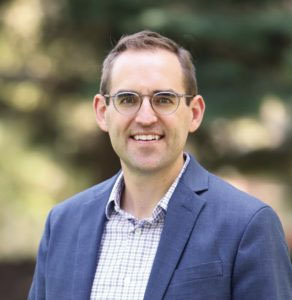
Kyle Klute, OD, (second from left as you are looking at photo) with his practice team. Dr. Klute says there is great merit and significant practice- and profitability-growth opportunities to focusing on primary eyecare.
The many reasons to remain a generalist.
By Kyle D. Klute, OD
March 20, 2024
“I hope I never fit a single patient for contact lenses.” This was my wish as I finished up my ocular disease VAMC residency 10 years ago. I also hoped I’d never have to see pediatric patients. Wow, was I wrong about my future!
Is Specialization Really Necessary Practice Survival?
Many in the eyecare industry are convinced that optometrists must specialize to survive. A recent article published in Review of Optometry summarized a survey taken by 506 optometrists and 95 optometry students.1 It found three out of four respondents agreed that there should be sub-specialties in optometry.
Further, specialization is often viewed as the answer to a branding and profitability problem in optometry.2
Must we all specialize to survive?
The key word here is all. Can and will some ODs specialize (or sub-specialize as the above survey described) into niche areas such as vision therapy and work in OD/MD settings where they mostly manage glaucoma or dry eye? Of course.
The problem, however, is I sense a growing preference, and even a superiority, given to specialization in optometry. As if comprehensive, primary care, optometry is too shallow, or unprofitable, or perhaps just not cool enough.
The Strength of Being a Generalist
Either way, I believe the generalist approach, the primary eyecare, do-it-all, practitioner, who weaves together the management of both refractive and disease management, is the best and truest expression of optometry. More importantly, our patients are best served with a comprehensive approach.
Why am I pushing back on this growing preference and over-emphasis on specialization? Here are my five reasons:
Specialization Hurts Rural Practices
Specialization is urban-centric. Rural areas rarely support specialization-only practices. Thus, the perception of practicing in a rural area is negatively affected. These areas are already struggling to find ODs, and the preference for specialization will further limit the pool of candidates willing to practice the comprehensive, primary care these locations demand.
Chronic Eye Diseases are Rarely Isolated
Diabetic and myopic patients are at higher risk for glaucoma. Glaucoma patients often have dry eye. The majority of all those patients need good refractive care. My friend and mentor, Robert Vandervort, OD, says it best, “Patients are entitled to more than one condition at a time.” Also, most patients do not need specialized expertise. I believe we can manage ~95 percent of patients by applying available clinical practice guidelines and a little courage.
Other Articles to Explore
The Average Eyecare Consumer Does Not Care that You’re a “Specialist”
I hate to say it, but the vast majority of patients do not care about our externship site locations, residency or those extra certifications. Yes, we’ve worked hard and want recognition, but most patients just want their blurry vision fixed. They are in our chair merely because their insurance said we are on their list.
Specialization Perpetuates a False Dichotomy Between Refractive & Medical Eyecare
Are optometrists not the champions of refractive eyecare? We’ve been beating the drum that refractive care is medical care for a half a century, right? So why separate it now? Is it because we are so influenced by what our patient’s managed vision care and medical insurance dictate? Or now that we have enjoyed the sophistication and gained prominence in medical management, is it that we think refractive care isn’t fashionable enough? The best care is the complementary, integration of refractive and medical eyecare.
Specialization is NOT Best for Your Patient
I believe our patients would rather get everything they need for their eyes in one spot. They may adhere to your advice to go to one doctor for their glaucoma, another for their macular degeneration, and another for their contact lenses. But is the additional time and cost worth it to them? Is it sustainable for the entire financial system?
Value of One-Stop Eyecare
After residency, I spent three years in an ocular disease referral center managing mostly glaucoma and dry eye patients. Transitioning to comprehensive, primary care practice was difficult. I saw pediatric patients. I had to fit contact lenses. I had to figure out how to integrate the management of my patients’ refractive and medical eyecare. This proved to be more difficult than I imagined. But I saw how impactful it was to patients when I was able to integrate the management of their glaucoma, diabetes, dry eye and contact-lens prescriptions.
Additionally, I saw how financially rewarding the do-it-all approach was for my practice. Prior to purchasing, my practice had minimal growth in year-over-year revenue. However, since our purchase, we’ve experienced 20-25 percent growth for five consecutive years and a revenue per doctor hour averaging between $650 and $700.
I don’t expect this to slow down as we continue to expand and grow each area of chronic disease management (myopia management, in-office dry eye treatments, macular degeneration, etc.) with new technologies for diagnosis and treatments.
“I can do that all here?” was a common response I heard from patients.
“Yes, it is best that we do all that here,” I would say to them. It is best for them, for our practice and for the profession.
References
- Jack Persico, E.-C. (2023, October 11). “Optometrists ready to step up to subspecialization.” Review of Optometry. https://www.reviewofoptometry.com/article/optometrists-ready-to-step-up-to-subspecialization
- Jason Carruthers, R. (2024, January 16). Independent Optometry’s branding problem & what you can do about it. Review of Optometric Business. https://reviewob.com/independent-optometrys-branding-problem-what-you-can-do-about-it/
 Kyle D. Klute, OD, is the founder and lead optometrist Good Life Eyecare, a multi-location practice in Eastern Nebraska and Western Iowa. He is a fellow of the American Academy of Optometry and an editor for the Journal of Medical Optometry. He writes and lectures on billing and coding, evidence-based medicine, and the management of ocular disease in primary care. Follow him on LinkedIn for daily articles, protocols and insights for medical optometry practice growth. To contact him: kdklute@gmail.com
Kyle D. Klute, OD, is the founder and lead optometrist Good Life Eyecare, a multi-location practice in Eastern Nebraska and Western Iowa. He is a fellow of the American Academy of Optometry and an editor for the Journal of Medical Optometry. He writes and lectures on billing and coding, evidence-based medicine, and the management of ocular disease in primary care. Follow him on LinkedIn for daily articles, protocols and insights for medical optometry practice growth. To contact him: kdklute@gmail.com



























